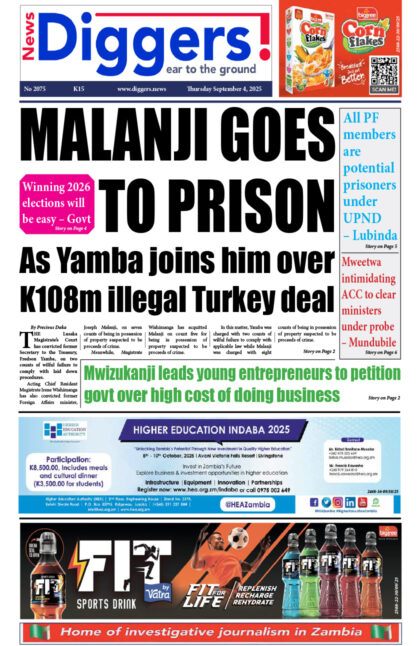A consortium of Civil Society Organizations say Zambians must be worried because the PF’s political architecture is a danger to peace and stability of the country.
And the CSOs say the appetite to cling to power by the current crop of leaders is worrisome and undermines the country’s democracy.
Meanwhile, the church says the three mother bodies opted to shun the NDF because government did not address the issues they had raised regarding the Dialogue Bill.
In a joint statement which was read by ActionAid country director Nalucha Ziba, the stakeholders said the just ended National Dialogue Forum attempted to reduce the sanctity of the Constitution making process to an eating place in Chibolya.
The CSOs which endorsed the statement include Caritas Zambia, ActionAid Zambia (AAZ), Alliance for Community Action (ACA), Civil Society Constitutional Agenda (CiSCA), GEARS Initiative, Water Aide Zambia, and other governance activists like former Law Association of Zambia (LAZ) president Linda Kasonde, Lewis Mwape, and former NGOCC board chairperson Sarah Longwe.
“We must be worried that the PF political architecture is a danger to peace and stability of our great nation. Citizens manipulation through a politically driven outfit-the NDF is an unfortunate undertaking that attempts to reduce the sanctity of the Constitution making process even to any legislated canteen in Chibolya (in Lusaka) or Twapya (in Ndola) compounds. The NDF totally deviated even from the commitments and assurances by both the Minister of Justice Given Lubinda and the Republican President His Excellency Mr Edgar Chagwa Lungu,” Ziba said.
She noted that NDF did not match up to the initial dialogue process which the church was lobbying for.
“The initial dialogue process was proposed as a platform to bring together political actors and other stakeholders to deal with the tension that had arisen and continues to polarise the country on the basis of political, tribal, regional, religious and sector affiliation. We however note that the dialogue process was turned into a legislative process, principally to amend the constitution as well as to amend the Public Order Act, Electoral Process Act and to review the Political Party Bill. The national Constitution, being the supreme law of the land, must be respected and its sanctity preserved. There, the changing of the constitution cannot be simplified to the NDF process we had recently, which lacked national consensus and inclusiveness. We are also concerned the NDF does not offer a credible platform that could be entrusted with the responsibility to deal with the constitutional matters. The forum lacked transparency as citizens were not provided with an opportunity to participate and contribute to whatever was going on in the forum,” she said.
And reacting to the NDF resolution to have a coalition government, the Ziba said the appetite to cling to power by the current crop of leaders was worrisome.
“The proposal is therefore fundamentally inconsistent with the Zambian presidential system of government as it essentially proposes the conjoining of individuals to form government. Yet we all know that in a presidential system, the voters elect a president by direct votes and not by combining vote of contestants which would subvert the will of the people, in which case the forum proposes to force of rule of the people by those rejected by the people. The appetite to hang on power by the current crop of politicians is worrisome; and surely undermines our young democracy. It is thus regrettable that the NDF was used as a safe passage of unjustifiable doctrine of democracy,” said Ziba.
The CSOs also objected the NDF resolution to bring back deputy ministers saying that it would further burden on the national treasury.
Meanwhile, the CSOs said the resolution to allow ministers stay in office after dissolution of parliament was unfair and meant to perpetuate incumbency as well as to allow ministers use government resources for mobilization and campaigns.
And Caritas Zambia coordinator Eugine Kabika said the church decided not to participate at the NDF because there were some pending issues which still needed to be resolved.
“When the NDF was still a bill, the three church mother bodies presented a statement to the parliamentary committee and this statement was shared widely. And they cited areas that needed to be changed in order for the church to be comfortable but at the end of that statement, they without any element of doubt concluded that as a result of these issues that are in the bill, if they are not taken care of, the three church mother bodies were not going to participate. The three church mother bodies were going to sit together and make a joint presentation to NDF and a select people were going to represent them at the NDF but that did not happen. So the three church mother bodies officially did not participate in the NDF. So it there are some who attended, maybe [they did so] individually but collectively, that did not happen,” said Kabika.
Meanwhile, opposition ADD president Charles Milupi, who was also in attendance, said the opposition alliance was still waiting for the three church mother bodies to carry out their prophetic mandate of ensuring that the dialogue process which was launched on January 18, 2019 carries on and brings reconciliation among political leaders and the nation at large.























